
We’ve been trained to believe something that’s just not true. Go out and ask 100 people how long a water heater can last, and the majority probably will say it’s in the range of 10 to 15 years. Where did this idea come from? Well, it’s nothing more than an assumption based on how often water heaters get replaced. But what if a water heater could last decades?
As it turns out, water heaters really can last decades. Larry Weingarten, one of the most knowledgeable hot water experts in the world, wrote this in his new book*: “The average life of tank-type water heaters is nine to twelve years, but with periodic maintenance I’ve gotten fifty years from them!”
Wow! That’s my goal now. Especially since I spent a bunch of money on a nice heat pump water heater, I want my investment to last as long as possible. I definitely don’t want to replace it because the tank goes kaput while the heat pump still has life in it. The only problem for me with making it last 50 years is also making myself last that long. If I do, I’ll be 109! But I’m not sure my anode rod will last that long.
Check and change the anode rod
You can go online and find tons of information about how to extend the life of your water heater. In a quick search, I found articles with 1, 3, 4, 5, 6, 8, 9, and 13 tips for making your water heater last longer. I’m going to give you just two here. The first is checking and changing the anode rode.
![New vs partially depleted anode rods [Image source: Burton AC Heating Plumbing & More]](https://www.energyvanguard.com/wp-content/uploads/2023/06/water-heater-anode-rod-depleted-vs-new-burton.jpg)
But if you put a magnesium or aluminum anode rod in the tank, it attracts the corrosive particles to spare the tank. That’s why it’s sometimes called a sacrificial anode rod.
The photo above shows a partially depleted anode rod next to a new one. If you never change the anode rod, all the material you see on that old one will disappear, too. All that’s left then will be a straight piece of metal not much thicker than a metal coat hanger. So, check and change the anode rod regularly.
Drain the tank
The second big thing you can do to make your water heater last decades is to drain and refill the tank regularly. Over time, sediment builds up in the bottom. Some of it comes in with the supply water. Some of it is created in the tank. Where do you think that stuff from the anode rod goes as it corrodes?
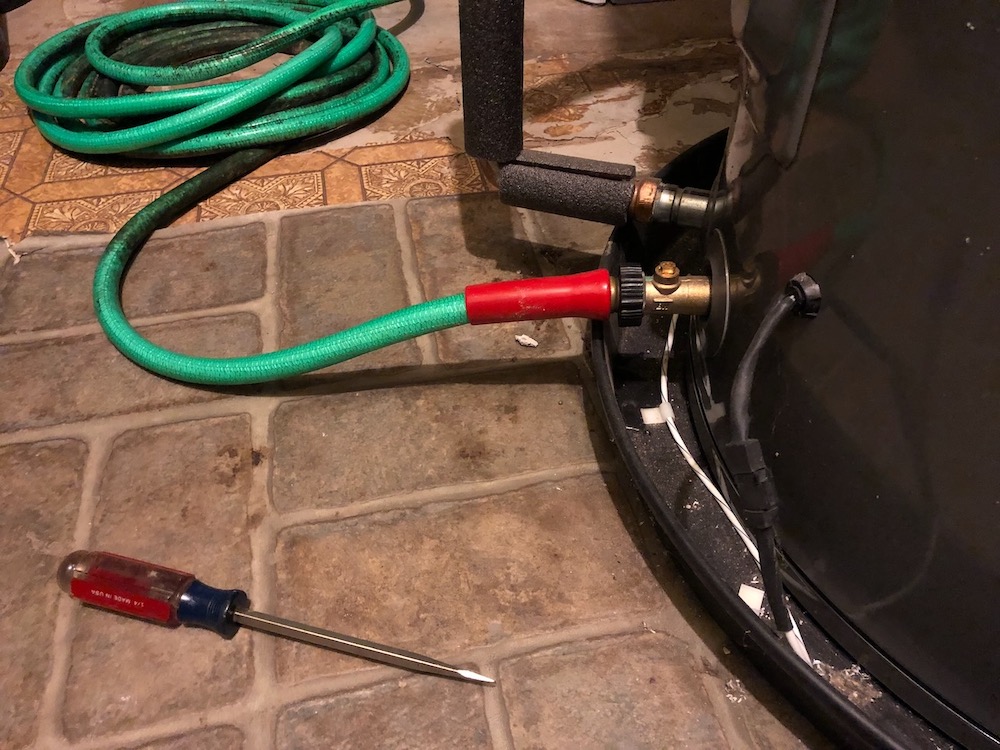
Draining the tank is easy. All you have to do is hook up a hose to the drain on the bottom and let it drain to the outdoors or to a nearby drain.
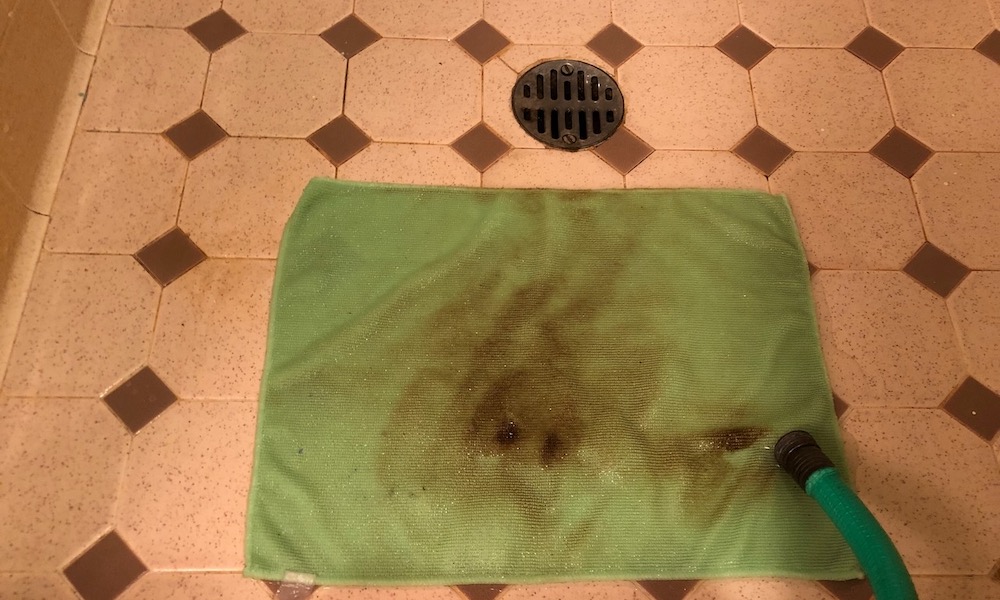
I’ve drained mine once and need to do so again this year. You can see in the photo above that I got a little bit of sediment out of the tank. That was after two years of use. Our water supply here in the Atlanta area is pretty good. It must be because the water heater that I replaced was 20 years old, and I’m sure it had little or no maintenance in its lifetime.
Believing impossible things before breakfast
Do those two things and your water heater can last decades. The frequency that you’ll have to change the anode rod and flush the tank will depend on the quality of the water you put in the water heater. If you have hard water, which has a higher mineral content, your anode rod will corrode faster. Be careful about trying to extend the life with a water softener, though. See Larry Weingarten’s comment below.
For those of you who haven’t had breakfast yet today, I hope I’ve helped you believe at least one “impossible” thing. As the White Queen in Lewis Carroll’s Through the Looking Glass said to Alice, “Why, sometimes I’ve believed as many as six impossible things before breakfast.” It just takes practice!
*I highly recommend Larry Weingarten’s new book, The Philosopher’s Wrench. It’s practical, philosophical, and whimsical.
________________________________________________________________________
Allison A. Bailes III, PhD is a speaker, writer, building science consultant, and the founder of Energy Vanguard in Decatur, Georgia. He has a doctorate in physics and is the author of a bestselling book on building science. He also writes the Energy Vanguard Blog. For more updates, you can subscribe to the Energy Vanguard newsletter and follow him on LinkedIn. Images courtesy of author.
Weekly Newsletter
Get building science and energy efficiency advice, plus special offers, in your inbox.





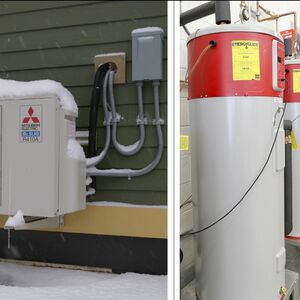
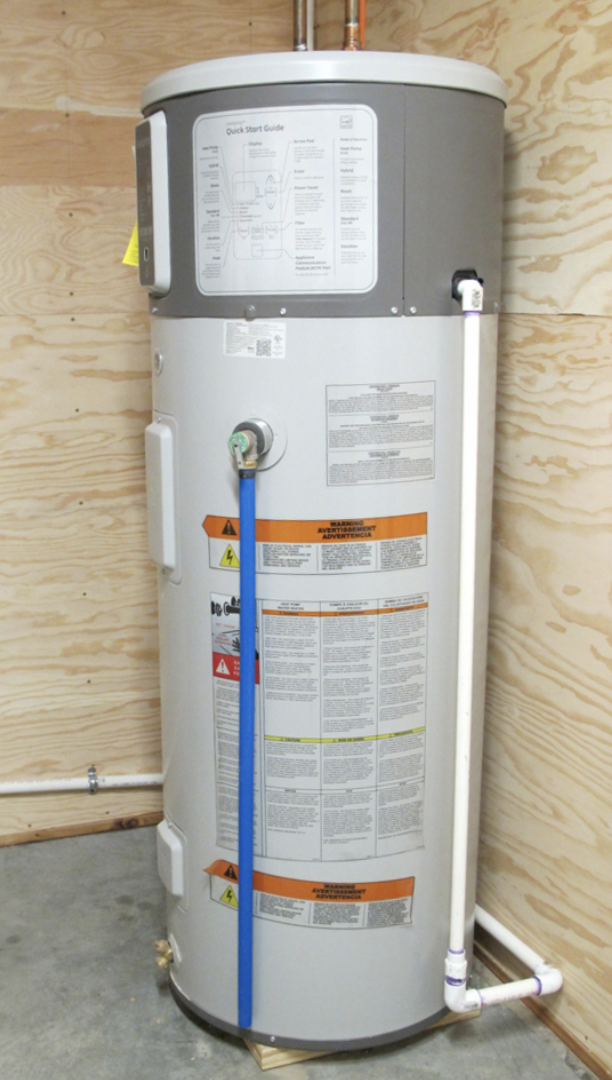

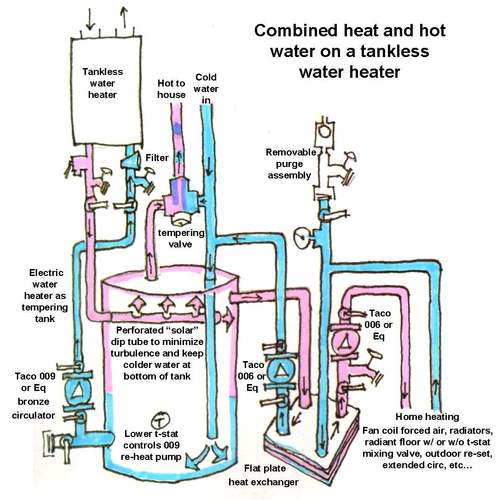






18 Comments
With those steps, your water heater TANK can last for decades. There's no evidence to date that the heat pump mechanism of a HPWH will last anywhere close to that amount of time.
My first HPWH was a first-gen GE model. It abruptly stopped working after five years or so (wouldn't even fall back to just resistive heat). I couldn't get anybody to fix it or sell me the parts to do it myself, since GE completed disavowed that model. I was left with a water heater with a tank in great shape but couldn't function as a water heater at all.
I bought a Rheem unit to replace the GE and so far, so good... but the heat pump part (including computer) will eventually need work and the only way this heater lasts is if it's even possible and economical. Time will tell.
Kurt: Agreed. It's a wait-and-see thing right now with the heat pump, but I'd hate to have to replace the whole water heater because of preventable tank problems.
"So, check and change the anode rod regularly."
Easier said than done. When you come to change it you will find it had been buried in spray foam several inches thick you will need to scrape out and off the nut head through a very small hole in the tank shell. As several years have probably passed since you purchased it you will find that even with an extended bar on your handle (attached to the large, deep socket you need to buy just for this), it is stuck and will need an impact wrench to remove.
If you are serious about changing the anode periodically, you should prepare it the day you install the heater, and loosen it at least annually.
Malcolm: Good advice. Also, many water heaters sit in rooms with ceilings too low to pull the anode rod out without cutting it.
If and when I need a new water heater I plan on installing a powered anode before installing it, when it will be easiest to do so. My current electric water heater is 24 years old. Last year I replaced the anode and dropped a camera into the tank to see how close it was to needing replacement. While the anode was nearly gone, it appears I changed it out in time. I was fully expecting to need to replace the tank, but with a new top heating element and flexible anode it's working great. I used an impact wrench to remove the anode. Without one you'll want a big breaker bar.
The next time I flush it I plan on installing a better drain valve I purchased from waterheaterrescue.com, where I first learned about Larry. They even make replacement dip tubes based on your water heater's measurements.
I read Larry's earlier book, "The Water Heater Workbook: A Hands-On Guide to Water Heaters" and am now optimistic that as long as I keep the anode in good shape and flush it regularly my water heater should last quite a while yet. If a heating element burns out they're available at most hardware stores for less than $30. I was about to replace it with a rheem marathon that wouldn't rust out as I was uncertain about the lifespan of a heat pump water heater and can't readily fit one in my crawl space except for the SanCO2, but am hoping to have a while before I have to make further purchase decisions.
It's funny because I am up north, closing down my cabin in the woods for winter, and was just thinking that it is time to replace the 30-year-old water heater. I have done the thermostat and the heating element but never knew about the anode! Looking at this photo I just took, I am surprised they let me write for this site.
I am also on Toronto so I relate to your stories.
I wonder, in what part of Ontario is your cabin?
Dorset 250 km north. hard to close with a morning like I had today
One way to help it last is to spend $20 and change the cheap plastic drain valve with a brass one when it's new. The plastic one is likely to fail, leak and be seized in the threads and require chiseling out
AC200: Good advice. That's one of the things Larry Weinberg recommends, too.
Weingarten, not Weinberg. How easy is it to get to the anode on your HPWH?
Is the anode rod even necessary if you run a heat pump water heater in heat pump mode all the time? I thought the anode rod sacrifices itself only if there is power going into the heating element and in my situation, I keep the heating element off all the time.
I have a 10 year old 2nd gen GE heat pump water heater that still works. I have the upgraded fan for this unit that was made available as a recall and I installed that myself.
Sacrificial anodes work regardless of what is on in order to protect the tank. I wish more water heaters came with a powered anode that could last 20+ years, particularly heat pump water heaters given their higher cost and increased difficulty of accessing the anode. The main time an anode is less needed is if the tank is immune to rust, like with SanCO2's stainless steel tank or Rheem's Marathon with a plastic liner.
acrobaticnurse,
"The main time an anode is less needed is if the tank is immune to rust"
Less needed, or not needed at all?
The Marathon does not have an anode.
I added a better external filter (see pic) for my rheem gen 4 hybrid hot water heater. I never want to clean coils if I can avoid it. Rheem should bring back the duct port which is missing in their current hybrid (gen 5).
One thing I would recommend for new installations is, instead of buying a heat pump water heater is spend a little extra and buy a heat pump and a heat exchanger tank. A good stainless exchange tank can be maintained and last, the heat pumps in my opinion still have a ways to go and being able to work on them separately (if done right), can lower the total cost of ownership. It also gives you more flexability in sizing and distribution for other uses besides just DHW.
Can you provide an example? Thanks!
Log in or create an account to post a comment.
Sign up Log in